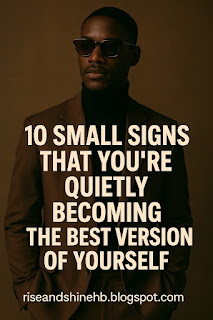Sometimes, it’s in the quietest shifts, the tiny inner wins, the calm “no,” or the moment you walk away from what you once begged for.
I remember when I first started university, I thought leveling up meant dressing better, posting more, or being louder in rooms.
But growth surprised me. It wasn’t flashy. It was subtle. Invisible, even.
And yet, looking back, those tiny moments were proof that I was slowly becoming someone I’d be proud to know.
Here are 10 small signs you might be evolving into your best self, even if no one’s noticing (yet).
1. You’re more intentional with your time
You no longer say yes to everything.
Friday night plans you would’ve once forced yourself into?
Now, you’re okay with choosing rest. You prioritize things that nourish your soul, not just your social status.
2. You don’t react to everything anymore
Remember when every rude comment or ignored message used to sting?
Now, silence doesn’t scare you. You’ve started choosing peace over proving a point. That’s emotional maturity.
Psychologists call it response flexibility and it’s a strong indicator of inner growth.
3. You’re comfortable being misunderstood
You’re done explaining your every move.
Not everyone deserves access to your thoughts or reasons.
You’ve realized that some people will never see your worth and that’s not your job to fix.
That’s not arrogance. That’s self-respect.
4. You no longer chase closure
You’ve stopped knocking on closed doors. Instead of obsessing over “why it ended,” you focus on how it freed you.
You trust that some endings are disguised beginnings.
5. You’re healing patterns, not just symptoms
You’ve started asking deeper questions.
Not “Why does this keep happening?” but “What within me is attracting this?”
That shift from blaming to self-inquiry is powerful.
You’re not just treating the pain you’re understanding the root.
6. You find joy in simplicity
Your definition of happiness has changed.
It’s no longer tied to big events or external validation.
A slow morning, a good book, a text from someone who gets you that’s enough.
Psychologically, this is called contentment, and it’s deeper than pleasure.
7. You have stronger boundaries even if they feel uncomfortable
You’ve realized that love isn’t proven by how much you endure.
You’re learning to say, “This doesn’t work for me,” without guilt.
Setting boundaries may feel awkward at first but that discomfort is temporary.
Your peace is forever.
8. You celebrate others without comparing yourself
Someone else’s win no longer feels like your loss.
You cheer louder, support genuinely, and trust that your time is coming too.
That mindset shift means you’re moving from scarcity to abundance.
9. You reflect more than you regret
You’ve stopped beating yourself up over past mistakes.
Instead, you analyze, learn, and evolve.
Reflection becomes your compass, not your cage.
You trust that every version of you did the best it could.
This is deep emotional intelligence and it’s rare.
10. You feel more aligned, even if it’s quiet
Maybe you don’t have it all figured out. But something feels right.
You sleep better. You breathe deeper.
You feel more “you”. That quiet sense of alignment is proof that you’re not lost you’re growing.
Final Thoughts
Growth doesn’t always look like a promotion, a glow-up, or a public transformation.
Sometimes, it’s in the quiet habits, the slow mornings, the gentle self-talk.
You won’t always get applause for becoming a better version of yourself but you’ll feel it in how light your heart becomes, how peaceful your mind feels, and how much more you you finally are.
If these signs resonate with you even just one then trust this: you’re on the right path.
Keep going.
Quietly.
Steadily.
Bravely.













